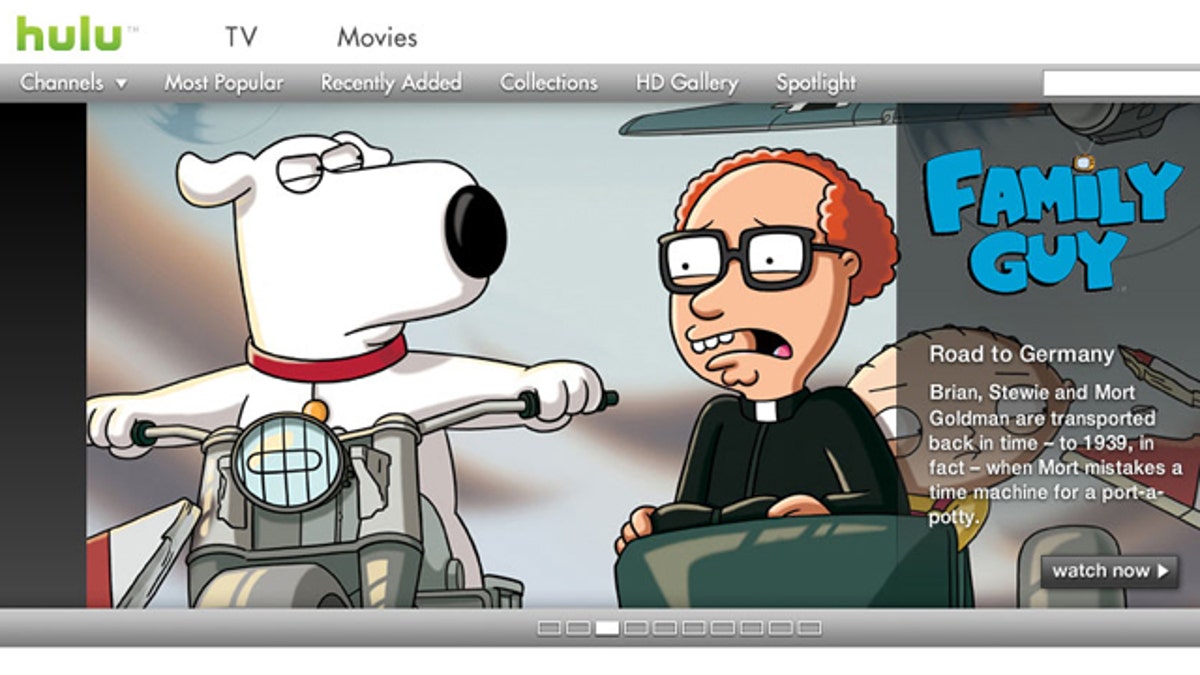
Popular Web site Hulu lets you watch television such as the animated series Family Guy shows over the Internet. (Hulu)
One day you're a Web sensation, the next nobody returns your e-mails. Hulu may end up learning this fact the hard way.
Just a few months ago, Hulu was a media darling. Now the site -- co-owned by Comcast, News Corp. (the owners of FoxNews.com), Walt Disney Co., and private investors -- is reportedly looking for a buyer. And while many financial analysts believe it's still a hot property, corporate shoppers may give the company the cold shoulder.
The main reason is the roiling state of the television and video entertainment business. Cable companies, movie makers, television production houses, and media companies are still trying to adapt to the world of Netflix, Internet-ready TVs, and the iPad.
No one is quite sure what will be the prevailing medium once traditional TV channels are gone (yes, gone). They're even less certain how to make money in the future. Hulu was in large measure an experiment -- one that may have already run its course.
The Fox network just announced a major Hulu policy change, for one thing: Instead of being able to catch House online the day after it airs on cable and satellite, you'll have to wait 8 days to see it free on Hulu -- or shell out $7.99 a month for Hulu Plus.
To this policy Fox plans one critical twist: Subscribers to approved distributors -- such as, say, Time Warner Cable or the Dish Network -- will also be able to see shows online the next day. Such a move is designed to keep viewers from abandoning traditional TV and keep cable and satellite partners happy.
Fans of the iPad will notice this closely parallels the wildly popular HBO Go app, which lets viewers watch HBO shows on an iPad or Android phone wherever they are, as long as they are already subscribers to the premium cable channel.
Cable companies are also taking to tablets. Time Warner Cable and Cablevision offer many of their channels live on the iPad. However, you have to be connected to your local Wi-Fi network. You are not free to move about the country.
The threat, of course, is that networks like Fox and channels like HBO could eventually go it alone. All they need to do is offer their fare as dedicated channels online, which could stream directly to an iPad or Internet-connected TV. Then viewers would be able to pick and choose stations a la carte -- an idea the cable companies hate (okay, it kind of scares the networks, too).
Indeed, the Net's new HTML5 standard will make this exceedingly simple. By using that next-gen programming language, Web sites can become individual channels -- no app required. No Hulu required, either.
Then there are those who hope to do away with the set-top box entirely. This has been pushed before in the form of CableCards that would slip into the back of a TV. Cable companies fought CableCards tooth and nail, but now the success of companies like Netflix are forcing them to make nice with the consumer electronics and computer companies like Sony and Microsoft -- both of which plan integrated support for cable.
This will in effect put all your video options -- Amazon, Netflix, YouTube and the cable guide -- together on a single screen competing against Hulu for your attention.
Meanwhile, the companies that create and control the video content are hedging their bets and making deals all over the Web. CBS recently nailed down deals to put hits from Showtime and its network on Netflix. CBS made a similar deal with Amazon, as has NBC. All of this undermines Hulu's position as the up and coming supplier of TV shows online.
So who do analysts think should buy Hulu given the clouds gathering over the video landscape? Apple is still struggling with Apple TV and could be a potential purchaser. But the movie companies are leery of Apple after witnessing what it did to the music business. They might abandon Hulu if Jobs and company bought it. Yahoo could certainly use a boost, but it doesn't have much to offer for Hulu's dowry.
Google could leverage Hulu on its still immature Google TV service, but for that to work Google would have to reconcile with Viacom, which owns properties such as Comedy Central and has been in protracted legal fisticuffs with Google's YouTube.
Still the most pressing problem is that other Hulu content providers like NBC and ABC will follow Fox's lead and end up essentially favoring cable subscribers over Hulu viewers. If this were to happen, Hulu would be worth much less than its perceived value today.
Could Hulu still find a buyer? Perhaps, but not at the reported $2 billion it's currently asking. That's a lot to pay for an R&D project.
Follow John R. Quain on Twitter @jqontech or find more tech coverage at J-Q.com.
